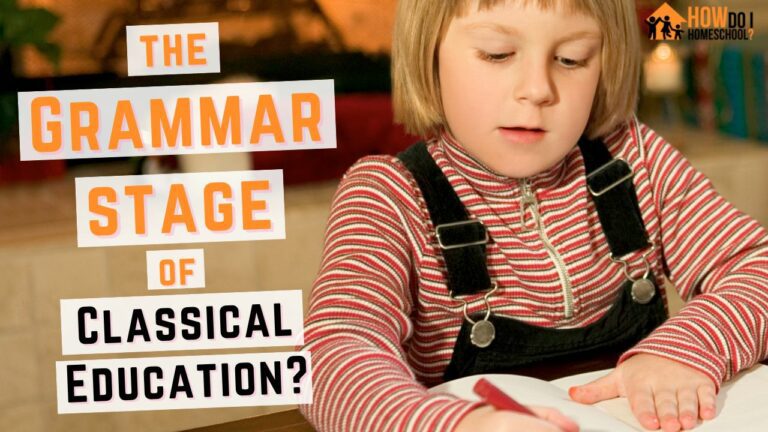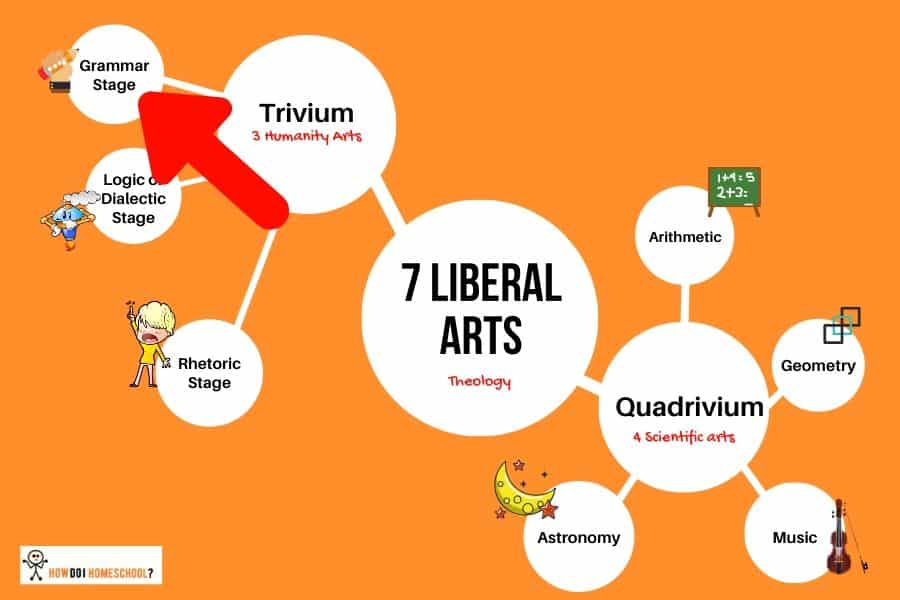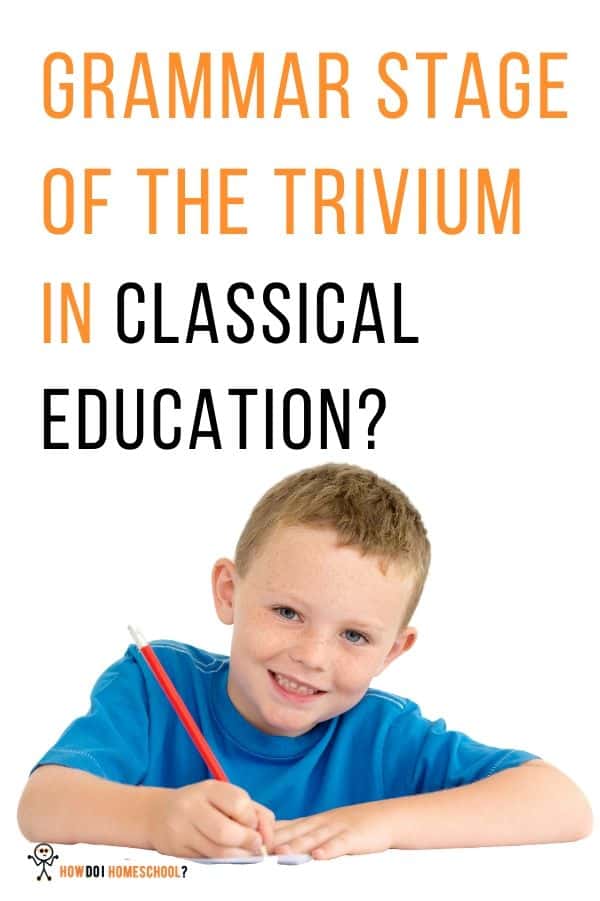The grammar stage of classical education marks the initial phase of the trivium, serving as the starting point for students on their educational journey. Here, children engage in enjoyable learning, acquiring foundational knowledge that will later be organized and utilized in the subsequent stage of the trivium, known as the logic stage. During the grammar stage, students delve into the structure and mechanics of a language, often Latin, which provides them with invaluable skills as they progress through the remainder of the trivium, secondary education, and the comprehensive study of the 7 Liberal Arts in tertiary education for those who choose to pursue it.
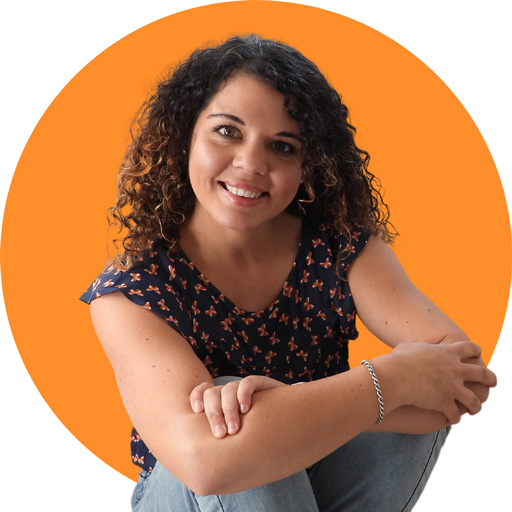
I hope you enjoy reading this blog post. If you want to do my course on how to homeschool, click here.
This article will discuss the grammar stage of the trivium in detail. It is one in a series of classical education articles, which can be found here.
I’ll also discuss various classical homeschool curriculum options you can get further down the page (including a free consultation with Veritas Press).
Some of the links in this post are affiliate links.
What Does ‘Grammar’ Refer to in the Classical Education Context?
When we think of grammar today, we think of ‘split infinitives’ and ‘subject-object’ relationships in the English language.
And this is what grammar is.
However, when it is referred to in the classical context, educators and classical education blogs usually refer to a wider concept than is understood today.
This is what Douglas Wilson in The Case for Classical Christian Education said about this stage:
In the classical method, grammar refers to the body of information that must be taken in by the student, information given at the beginning of the course of instruction. Grammar is the simple inculcation of the facts of the case, and the youngest student can grasp this. p. 134.
As such, grammar isn’t referring to language skills alone.
It includes the basic building blocks of different subjects.
The grammar of:
- mathematics would be addition and subtraction tables
- science would be the names and characteristics of flora and fauna
- geography would be towns, rivers, continents, and mountain ranges
- history would be names, dates, battles, and timelines.
When we learn these basic building blocks, we learn knowledge or grammar.
What Age Are Children in the Grammar Stage?
Children are around ages 4-11 when they study the grammar stage of classical education.
This corresponds roughly to Grades K to 6. They are at an age where they love taking on information.
Classical educators refer to this as the ‘poll-parrot‘ age.
What Children Are Like in the Grammar Stage of Classical Education
One of the great benefits of the classical method is that it teaches students according to their developmental level.
A classical curriculum will teach children to memorize at the stage of life when they love memorizing, argue when they love arguing, and present themselves persuasively when they want to present themselves persuasively.
The stage of life when children love reciting, chanting, memorizing facts and rote learning material is the grammar stage.
This is because they are like parrots who love repeating information back to you.
At the poll-parrot stage, children can repeat something over and over again without tiring of it one bit.
Like parrots, they don’t always understand what they’re saying or why they’re saying it, but they like doing it anyhow.
Teaching understanding the why and how will come later, but for now, we must teach ‘with the grain’ and load children up with facts they’ll find invaluable in the future.
Trying to do it later will be difficult and will take longer.
Recitation, Memorization, and Rote Learning
Many people believe rote learning is the enemy of education.
They say rote learning kills a child’s love of learning and embitters them toward education.
Or does it?
Classical educators believe this is not the case if rote learning is conducted in a stage of life when children love to rote learn facts.
If older children (past age 12) were required to rote learn like a 6-year-old, there might be some animosity towards their mode of education.
However, that is because a 12 or 15-year-old no longer enjoys taking on facts like a first-grader, and educators are teaching older students ‘against-the-grain’ if they insist on teaching this way. Douglas Wison says this about it:
At [the Poll-Parrot] stage children love to chant, memorize, and recite. When they want to take on data, we have them take on data. Most modern educators stumble at this point because of their antipathy to “rote learning”. They are chronologically troubled over nothing. Rote learning is a poor substitute for education when it is applied at the wrong place. But when accumulation of facts is a joy and a delight to a child, and quite a bit of it has to be done in any case, why not do it [in the grammar stage of classical education]? p. 136.
As such, classical education schools encourage children to do a lot of recitation in groups or individually.
Why Bother Teaching Latin in Classical Education?
Why should children learn a dead language like Latin?
Douglas Wilson phrased it like this, ‘Some things improve with age, like wine, but other things do not, like pizza.’
So is Latin like wine or pizza?
We’d like to argue that it is like wine.
There are several reasons for learning Latin in the grammar stage of classical education.
Still, I find the most persuasive one is that it enormously helps children to understand English and learn other languages.
Given that a large part of the grammar stage is meant to teach students the tools of language, it makes sense to learn Latin, which will help with this task.
Other reasons include that Latin:
- helps us appreciate other literature, especially ancient literature,
- strengthens mental acuity and makes learning in other subjects easier,
- makes learning more enjoyable as we easily grasp the meaning of words we don’t know, and
- helps one enormously if students want to become pastors or do other theological studies.
As such, Latin is a great language to learn and is a relatively easy one to get familiar with compared to other languages.
I am currently learning Latin with Compass Classroom and loving their fun lecture style.
How Much Will Learning Latin Help with Language?
Given over half our words originate from the Latin language, learning Latin gives us more context around commonly used words and helps us understand unknown words or words we may not be too familiar with.
Dorothy Sayers, the mother of modern classical Christian education, said this about the advantages of learning Latin:
I will say at once, quite firmly, that the best grounding for education is the Latin grammar. I say this, not because Latin is traditional and mediæval, but simply because even a rudimentary knowledge of Latin cuts down the labor and pains of learning almost any other subject by at least 50 percent. It is the key to the vocabulary and structure of all the Romance languages and to the structure of all the Teutonic languages, as well as to the technical vocabulary of all the sciences and to the literature of the entire Mediterranean civilization, together with all its historical documents. – Lost Tools of Learning, p. 10.
So, learning Latin will not only help students learn English, but it will help them learn other languages and understand the technical vocabulary used in other subjects such as medicine.
When You Should Start Teaching Latin?
Sayers believed children should start Latin as early as possible, “at a time when inflected speech seems no more astonishing than any other phenomenon in an astonishing world; and when the chanting of ‘Amo, amas, amat’ is as ritually agreeable to the feelings as the chanting of ‘eeny, meeny, miney, moe.’ ”
If parents wanted to teach another language, this would be the best time to do it as the mind is pliable and pleasantly disposed towards devouring word after word.
French and German are good consorts of Latin, especially as (like English) so much of their vocabulary is derived from the Latin language.
Subjects are of Secondary Purpose in the Grammar Stage
Many modern educators teach subjects to fill their student’s heads with facts; most do this ad nauseam.
Classical educators, by contrast, teach ‘subjects’ so their pupils have food to chew on in later stages:
So far (except, of course, for the Latin), our curriculum [in the grammar stage] contains nothing that departs very far from common practice. The difference will be felt rather in the attitude of the teachers, who must look upon all these activities less as “subjects” in themselves than as a gathering together of material for use in the next part of the Trivium. What that material actually is, is only of secondary importance; but it is as well that anything and everything which can usefully be committed to memory should be memorised at [the grammar stage], whether it is immediately intelligible or not. – Dorothy Sayers, Lost Tools of Learning, p. 12.
Except the child who asks, we should leave argumentation and explanations to the next stage, the logic stage, when children naturally start asking questions – and this is a good move according to Sayers:
The modern tendency is to try and force rational explanations on a child’s mind at too early an age. Intelligent questions, spontaneously asked, should, of course, receive an immediate and rational answer; but it is a great mistake to suppose that a child cannot readily enjoy and remember things that are beyond its power to analyse. p. 12.
As such, we teach a child ‘with the grain’ in the grammar stage, recognizing they love accumulating facts and reciting without yet needing or wanting an explanation for all they learn.
This will come later.
What Subjects are Taught in the Grammar Stage of Classical Education?
We need ‘subjects’ to learn knowledge to have material to ‘fiddle with’ in the rest of the trivium.
We also need a good grounding in languages to enter the logic and rhetoric stages of classical education.
Sayers said this about the need for subjects in the grammar stage of classical education:
“Subjects” of some kind there must be, of course. One cannot learn the use of a tool by merely waving it in the air; neither can one learn the theory of grammar without learning an actual language, or learn to argue and orate without speaking about something in particular. – Dorothy Sayers, Lost Tools of Learning, p. 6.
But, what subjects do classical academies have their pupils learn?
It seems subjects are, except for Latin, quite similar to that which is taught in traditional Christian academies.
In the grammar stage of classical education, the Westminister Classical Academy teaches:
- Habits
- Latin
- Music
- Science
- Arithmetic
- Visual Arts
- Biblical studies
- Physical education
- History and Geography and
- Literature, Composition, and Penmanship
The big difference is that these subjects are taught with the attitude of them being tools to be used in the 7 Liberal Arts, particularly the Trivium’s next two stages, the logic and rhetoric stages.
Why Students Must Move on to the Logic Stage
The fault of modern education is that it never moves on to studying logic.
It leaves students with a bunch of facts and a language, but it doesn’t teach them how to reason and detect logical fallacies in the arguments of others, be it in newspapers, television, or the radio.
This leaves students at the mercy of the media or university professors.
Without moving onto the logic and rhetoric stages, we create uncritical and unthinking students who become fodder for ruthless political lobbying groups.
In essence, we create sheep.
We give them just enough so they can understand the bulletin board, but we don’t teach them to poke holes in weak arguments that should be thoroughly sunk.
But we need to do this.
We must teach our children how to define terms, make accurate statements, construct arguments and detect fallacies in arguments – all tenets of the second stage of classical education, the logic stage.
Another Reason to Move On From the Grammar Stage
Another reason to move on from the grammar stage of classical education is to avoid making insufferable know-it-all’s out of our students.
While nobody wants to raise a child without any idea of the world in which they live, a proud, ‘slip-up-correction-maestro’ is perhaps a more bearish prospect.
The Lord High Executioner in The Mikado was aware of this kind of kid – the ‘child who is up on dates, and floors you with them flat.’ Knowledge of grammar alone equips someone to play games of Trivial Pursuit but not much else. At the same time, attempting to go on to the other levels of the Trivium without this foundation is also disastrous. – Douglas Wilson, p. 132.
Children may be unbearable when we just equip them with facts and no way of properly using them or understanding them.
For this reason, it is vital to move on to the logic stage of classical education.
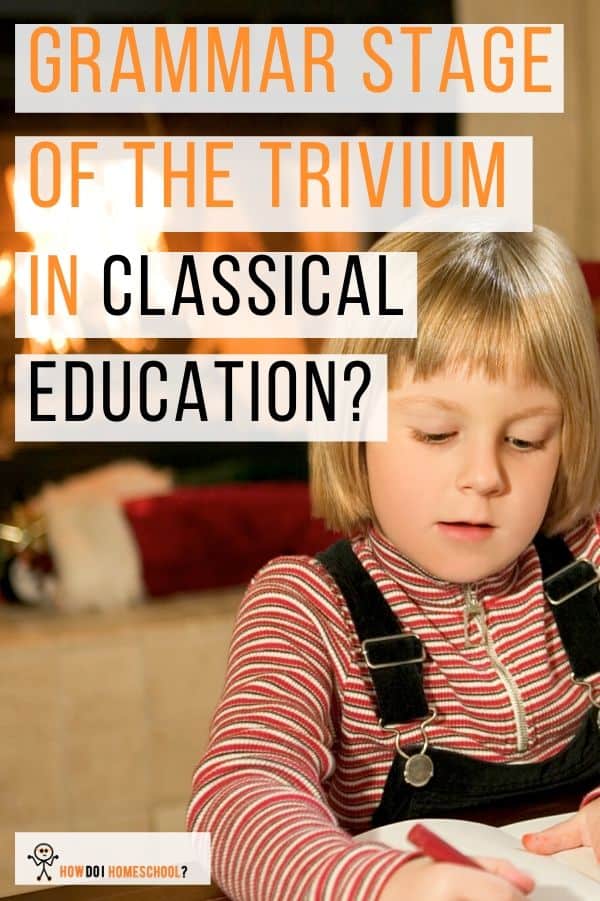
How to Get a Classical Education Curriculum for a Homeschool
If you want to use the classical homeschooling method in your homeschool, you don’t have to reinvent the wheel and create your own curriculum.
Instead, there are plenty of decent classical Christian education options around, such as:
- Veritas Press – great if you want more of an online program – book a free consultation with them here.
- Memoria Press – great if you prefer a mailable program
- Compass Classroom – an extremely affordable classical program with a hint of Charlotte Mason
- Classical Conversations – includes a homeschooling co-op focus
- Classical Academic Press – customize your curriculum with this one
- A Well-Trained Mind
- Tapestry of Grace – Unit Studies approach to a Christian curriculum
I’ve looked into several of these options, which can be found reviewed here.
Further Reading on the Grammar Stage of Classical Education
Two great books for further reading are:
- Dorothy Sayer’s Lost Tools of Learning. It is a must-read for anyone considering teaching their children using the classical education. This book is essentially the basis of classical Christian education today.
- Douglas Wilson’s The Case for Classical Christian Education. Wilson formulates his arguments heavily on Sayer’s book but adds plenty of flesh to the bones.
I’ve quoted extensively from both books in this blog as I’ve wanted to get down to the original sources of today’s version of classical education in the Christian context.
Subscribe to How to Homeschool (my Youtube channel!)
Have you caught the homeschooling bug?
Eager to delve deeper into the realm of unconventional education?
Well, my curious comrades, rejoice!
There are splendid avenues awaiting your exploration.
Firstly, hop on over to my YouTube channel, where a treasure trove of homeschooling wisdom awaits. From practical tips to delightful anecdotes, I unravel the mysteries of homeschooling with a touch of wit and wisdom.
Subscribe, hit that notification bell, and embark on an enlightening journey with me.
Enroll in the Homeschool Parenting Program
For those yearning for a comprehensive guide to homeschooling, look no further than my Homeschool Parenting Program.
This illustrious online course will equip you with the knowledge, strategies, and confidence to navigate the exhilarating world of homeschooling like a seasoned pro.
Enroll today and unlock the door to extraordinary educational possibilities.
Conclusion
The grammar stage of classical education inculcates children with a rich array of facts, equipping them with useful knowledge they can use for argumentation and debate in the latter two stages of their classical studies. Children learn lots of knowledge at a time when their brains are excited to rote learn information (this stage is called the poll-parrot stage). The grammar stage of the trivium progresses to the logic stage when children are roughly 12-years-old. You can learn about that stage here.
